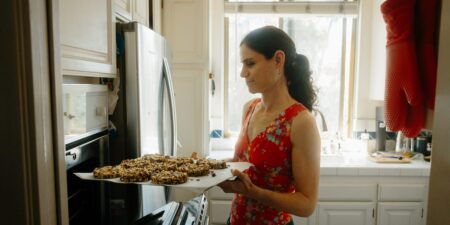When my daughter was a newborn, almost every time I left my New York City building, someone would ask, “Who’s taking care of the baby?”
Without missing a beat, I’d nonchalantly say, “Oh, I left her with a clean diaper and a bottle of milk. She should be good for a few hours.” The not-so-surprising reality was that her dad was with her. But for some reason, no one assumed that, because, apparently, fathers are mythical creatures when it comes to childcare.
Small interactions like the ones I had during my daughter’s first year reveal a much more pervasive societal problem: mothers are universally assumed, if not expected, to be the default parent. Even when dads are fully capable, present, and kicking butt at the whole parenting thing.
Moms are often the default parent
The default parent phenomenon in heterosexual relationships is embedded in every aspect of life.
It’s how schools call mothers first when a child is sick, or only follow up with the mom via email for administrative tasks. It’s in the pediatrician’s office, where questions are directed to mom even when both parents are present. It’s in the well-meaning people who ask, “Is Dad babysitting?” as if dads are temporary caregivers who swoop in like superheroes when needed. It’s not called babysitting when it’s your own kid. I’m not giving my husband pizza money and paying for his Uber ride to another home at the end of the night.
All of this is interesting (exaggerated for effect) and moderately comical, but it’s also important because default parent status creates an uneven distribution of responsibilities and reinforces unhealthy mentalities toward childcare and family life. Mothers, regardless of employment status outside the home, shoulder the majority of childcare responsibilities. Even in households where both parents work full-time, mothers spend significantly more time on childcare and are more likely to adjust their careers to accommodate family needs.
Moms are not better than dads
There’s a powerful, albeit completely incorrect, narrative that mothers have some biological ability to parent that fathers lack. We absolutely don’t.
I, personally, had a much harder time adapting to parenthood than my husband. This narrative ignores the reality that parenting skills are learned, not instinctually programmed by gender. My husband didn’t emerge from his mother’s cozy womb knowing how to change diapers any more than I did. We both figured it out through the time-honored tradition of trial, error, and the absolute horror of getting peed and pooped on, sometimes at the same time.
Workplace policies and societal structures continue to reinforce traditional gender roles. Paternity leave continues to be limited in the US, sending the clear message that fathers are secondary parents. Flexible work arrangements are marketed primarily toward mothers, not parents. Even family restrooms and changing tables in men’s restrooms are inconsistent, physically reinforcing that childcare happens in women’s spaces. It’s 2025, men can handle a diaper change without oversight and without the world blowing up.
Third, and perhaps most insidiously, we as a society have internalized these expectations. I catch myself “gatekeeping” parenting tasks, swooping in to change an outfit my husband picked out for our 15-month-old because it doesn’t “match.” I’ve had to recognize my own role in perpetuating the default parent problem and acknowledge that “my way” isn’t the only right way to parent. As it turns out, children survive (and thrive) just fine with slightly crooked ponytails and mismatched socks.
Both parents need to be recognized equally
Breaking free from the default parent trap requires multidimensional action. On a personal level, parents need to have direct and frequent conversations about how society places uneven expectations on mothers and fathers. This means challenging these assumptions not just within the household but also in the wild.
For dads, it means fully embracing parenthood without waiting to be asked or directed. It means becoming the parent who knows the pediatrician’s phone number, remembers that Wednesday is show-and-tell day, and notices when the children’s pants are getting too short.
And we mothers are not off the hook. This means letting go of the idea that we need to control everything to prove our maternal worth. It means stepping back and allowing our partners to develop their own parenting approaches and styles, even when they differ from ours.
We also need policies that recognize both parents as equally capable and responsible. This includes robust parental leave for all parents, workplace flexibility for all parents, and a conscious effort to shift how we talk about and portray parenthood in media and daily conversations.
Companies marketing to families need to recognize fathers as legitimate consumers of baby, kid, and family products, not bumbling idiots who need “mom-approved” items. Dads can also tell if a diaper is absorbent or if a stroller is easy to fold.
The default parent problem won’t disappear overnight. But by recognizing it, naming it, and actively working to dismantle it just as swiftly as my daughter demolishes her Magnatile castles, we can create a more equitable parenting ecosystem.
My hope is that by the time my daughter becomes a parent, if she chooses to, no one will ask her who’s watching her baby when she’s not around. People will assume what should be obvious: her child has two capable parents, both equally responsible for their care.
Read the full article here
















